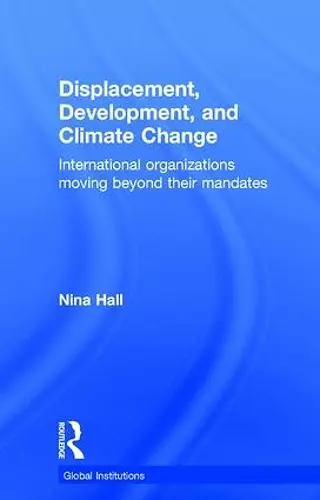Displacement, Development, and Climate Change
International organizations moving beyond their mandates
Format:Hardback
Publisher:Taylor & Francis Ltd
Published:6th Apr '16
Currently unavailable, and unfortunately no date known when it will be back
This hardback is available in another edition too:
- Paperback£39.99(9781138190542)

This book focuses on one critical challenge: climate change. Climate change is predicted to lead to an increased intensity and frequency of natural disasters. An increase in extreme weather events, global temperatures and higher sea levels may lead to displacement and migration, and will affect many dimensions of the economy and society. Although scholars are examining the complexity and fragmentation of the climate change regime, they have not examined how our existing international development, migration and humanitarian organizations are dealing with climate change.
Focusing on three institutions: the United Nations High Commissioner for Refugees, the International Organization for Migration and the United Nations Development Programme, the book asks: how have these inter-governmental organizations responded to climate change? And are they moving beyond their original mandates, given none were established with a mandate for climate change? It traces their responses to climate change in their rhetoric, policy, structure, operations and overall mandate change. Hall argues that international bureaucrats can play an important role in mandate expansion, often deciding whether and how to expand into a new issue-area and then lobbying states to endorse this expansion. They make changes in rhetoric, policy, structure and operations on the ground, and therefore forge, frame and internalize new issue-linkages.
This book helps us to understand how institutions established in the 20th century are adapting to a 21st century world. It will be of great interest to scholars and students of International Relations, Development Studies, Environmental Politics, International Organizations and Global Governance, as well as international officials.
'Hall’s assessment of how the UNHCR, IOM and UNDP have adapted their mandates and practices to address the climate change agenda is a welcome breakthrough in what we know about how international organizations change and why such change varies across different types of organizations. This will be important reading for any student of international organizations and a major contribution to policymakers who want to know how we can reform these major organizations to address one of the most pressing global issues of our time.' - Catherine Weaver, Associate Professor and Distinguished Scholar, The University of Texas at Austin, USA
'Hall provides a perceptive critique of why and how mandates evolve within international organisations. Her book is a must-read for all seeking to ensure that our global institutions remain fit for purpose.' - Sam Daws, Director, Project on UN Governance and Reform, Oxford University
‘This book provides fascinating insights into how international development, migration and humanitarian organizations are responding to the challenge of climate change.’ - Professor Jane McAdam, Scientia Professor of Law and Director of the Andrew & Renata Kaldor Centre for International Refugee Law, University of NSW, Australia
'In a highly complex and globalized world, it is inevitable that intergovernmental organizations need to change and adapt to new circumstances, such as global climate change. Nina Hall’s book shows in great detail such adaptation processes of three international organizations, and how they adapted to the emerging crisis of climate-related migration. The book emphasizes the special role that international bureaucrats play in shaping the policies of their organization and expanding its mandate. Displacement, Development, and Climate Change is an important addition to the burgeoning literature on intergovernmental organizations and bureaucracies, and a must-read for all who care, either as practitioners or scholars, for the international governance of climate-related migration.' - Frank Biermann, Copernicus Institute of Sustainable Development, Utrecht University, the Netherlands
ISBN: 9781138190535
Dimensions: unknown
Weight: 362g
191 pages